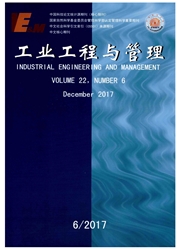

 中文摘要:
中文摘要:
以一个供应商、一个零售商与第三方物流(TPL)组成的供应商管理库存和第三方物流(VMI&TPL)三级供应链为研究对象,分别讨论了需求不确定条件下TPL无库存决策权和TPL有库存决策权两种情形下的供应链协调模式。研究发现,库存决策权的转移对VMI&TPL供应链绩效不存在绝对的影响,传统的收益共享契约不能协调VMI&TPL供应链。通过改进传统的收益共享契约,引入产品超储成本分担系数,改变供应链中TPL、供应商和零售商之间成本收益不协调的状况。协调后的VMI&TPL模型的订货量与利润达到集中决策下的水平。相关结论通过数值算例进行了验证。
 英文摘要:
英文摘要:
This paper studies a vendor-managed inventory and third-party logistics (VMI TPL) three-echelon supply chain that includes a supplier, a retailer and a TPL. Two supply chain coordination modes are discussed when TPL with and without inventory decision power in demand uncertainty scenarios. The results show that transfer of inventory decision power does not have absolute effect on the supply chain performance. The traditional revenue sharing contract does not coordinate the VMI~TPL supply chain. By incorporating the over-storage cost sharing factor to the revenue sharing contract, and unbalance cost revenue distribution for TPL, the supplier and retailer can be remitted. The ordering quantity and profit after coordination can achieve the level under centralized decision. The relevant statement is verified by numerical examples.
 同期刊论文项目
同期刊论文项目
 同项目期刊论文
同项目期刊论文
 期刊信息
期刊信息
